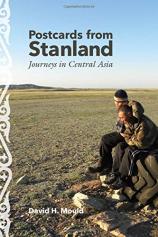Postcards from Stanland: Journeys in Central Asia
Review
Postcards from Stanland: Journeys in Central Asia
There are five “stans” (nations) in Central Asia: Tajikistan, Kyrgyzstan, Uzbekistan, Turkmenistan, and the largest, Kazakhstan. David H. Mould has seen them all, in his role as a UNICEF trainer among other professional connections to the region and as a proponent of what he calls “slow travel.”
Stanland, as Mould nicknamed this important region, generally has been little understood by outsiders, yet, owing to its strategic location (bordering Russia, China and the Middle East), it was once the focus of what was known as The Great Game --- the struggle for domination between the British and Russian empires. Never really unified except by geography, encompassing many languages and ethnic differences, the disparate pieces of Central Asia became part of the Soviet Union. And then suddenly, in the 1990s, they weren’t anymore. Most people would be hard put to name even a single country in Stanland, the names themselves being so confusing that even John Kerry, who should have known better, famously “invented” a new stan, “Kyrzahkstan,” in a speech at the University of Virginia.
"POSTCARDS FROM STANLAND is an ambitious undertaking, encompassing the history, politics, sociology and local color of a part of the world almost unknown and often misunderstood outside the territory. We would all do well to study and learn more from Mould’s observations."
Mould lived, traveled and worked in Stanland, as a Fulbright Scholar in the mid-’90s, and later as a representative of USAID, UNESCO and other international agencies poised to effect meaningful change in communications and social development in Central Asia.
The region is so complex, with oil interests and world politics playing footsy at the top, and widespread grinding poverty at the bottom, that this is necessarily a fact-packed book. One notable segment recounts the struggles of Mould and his wife, Stephanie, as they learned to navigate daily life in Bishkek, Kyrgyzstan. Arriving with 400 pounds of luggage and only a rudimentary knowledge of Russian, the couple made headway by miming what they needed at the local bazaar; Stephanie became quite adept at buying meat by carrying a diagram of a cow and saying “Moo.” It once took them two hours to pay a $2.50 phone bill because of the maddening bureaucracy, and even then the phone service was substandard at best. Heat was turned on, or not, sometime after winter set in, and electricity and water were shut off, well, whenever. Bribery was a constant. The author recalls the sad but unfortunately common sight of families in the city bazaar peddling their household belongings --- “clothes, pots, pans, kitchen utensils, personal memorabilia” --- to survive.
Through Mould’s adventures on the ground (he preferred travel by car when feasible, to see the country, despite the difficulties of such treks), the reader is given a sense that existence, even in the best of circumstances, must be challenging and at times threatening for Stanland’s denizens. But Mould also presents Stanland’s place on the larger world map. He notes, for example, that though Kazakhstan was guilty of flagrant violations of human rights, the country, whose rural population still has scant access to clean drinking water, was given a seat on the UN Human Rights Council, doubtless because of wider economic interests. His narrative is peppered with local jokes that underscore the paradox of life both during and after the “worker’s paradise” of the Soviet era --- the long lines, the lack of necessities, and the fear of speaking out.
POSTCARDS FROM STANLAND is an ambitious undertaking, encompassing the history, politics, sociology and local color of a part of the world almost unknown and often misunderstood outside the territory. We would all do well to study and learn more from Mould’s observations.
Reviewed by Barbara Bamberger Scott on April 1, 2016
Postcards from Stanland: Journeys in Central Asia
- Publication Date: February 4, 2016
- Genres: Nonfiction, Travel
- Paperback: 344 pages
- Publisher: Ohio University Press
- ISBN-10: 0821421778
- ISBN-13: 9780821421772





